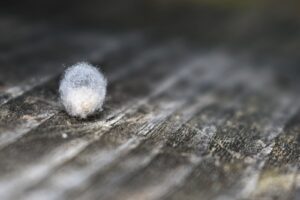Home / Blog / Spiders / A Closer Look at Nature’s Graceful Giant Huntsman Spider
A Closer Look at Nature’s Graceful Giant Huntsman Spider

Scientifically reviewed by Rachel Maldonado
-Published on March 11, 2024
-Updated on July 31, 2024
A Closer Look at Nature’s Graceful Giant Huntsman Spider
You’re sitting at home, enjoying a cup of coffee first thing in the morning, when suddenly, you see movement out of the corner of your eye.
While you might be terrified at the initial sight of the giant huntsman spider, the good news is there’s not much to fear. These gentle giants are graceful arachnids that play a valuable role in the environment (yes, even the indoor environment!).
What Does a Huntsman Spider Look Like?
The huntsman spider, also known as the “rain spider,” “wood spider,” “giant crab spider,” or the “lizard-eating spider,” depending on the species, belongs to the family Sparassidae. They’re most famous for their speed, agility, and unique hunting methods.
If you’ve never seen a huntsman spider up close, the appearance can be downright shocking. Picture a creature with a leg span wider than a child’s outstretched hand, and you’re on the right track. Their eyes reflect light, making them easy to spot at night.
The bodies of these spiders can range in color. Most commonly, they’re a grayish brown to a more earthy tone, allowing them to blend easily into their surroundings.
Unique Characteristics of a Huntsman Spider
If you’re curious about where the huntsman spider gets its name, it all has to do with its style of hunting. Unlike other spiders that rely on webs or silk traps to capture their prey, huntsman spiders attack in a single swift pounce.
To the untrained eye, it might seem like something out of a horror movie – but to the huntsman spider, it’s a way of life. So what does a huntsman spider eat?
This varies depending on the species, but most huntsman spider species prefer insects like moths, cockroaches, caterpillars, and even other spiders. Though not as common, some species of huntsman spiders will also feed on frogs, lizards, and even small mammals like mice.
In the home, one of the favorite meals of a huntsman spider is cockroaches. So if you see a huntsman spider in your house, that’s not necessarily a bad thing – they might be performing a valuable role as a pest control agent!
And if you see a huntsman spider running, that’s a good sign, too. Their long legs aren’t just for show: they use them to outrun and overtake their prey.
Do Huntsman Spiders Live in the US?
Huntsman spiders are found all over the world. Typically, they’re found only in warm temperate to tropical regions. In the United States, their reach is a bit more limited, with the spiders tending to favor warmer southern states like Florida, Texas, and California.
Ultimately, huntsman spiders prefer shelter that’s close to humans (and the pests we tend to attract) but not too close.
Common Myths About the Harmless Huntsman Spider
The most common myth – likely the question you’ve been wondering yourself – is whether huntsman spiders are dangerous to humans.
For the most part, huntsman spiders do not want to be in your home and will only wander inside by accident (or if they happen to detect a tasty meal there). They live in crevices of tree bark and while they might be startling with their size and springing jump behavior as they run, they aren’t at all interested in interacting with humans.
The problem is that huntsman spiders have a clinging reflex when they’re picked up. This can make them hard to shake off, and as a result, more likely to bite. Female huntsman spiders are also known to fiercely defend their young, so if you happen upon a cluster of egg sacs, you’re more likely to be bitten.
The good news? These spiders are not venomous. While there’s always the slight risk of an allergic reaction when you’re bitten by one of these spiders – and their bites can be painful – you don’t have to worry too much about long-term adverse effects.
Key Takeaways
As you can see, there’s more to the humble huntsman spider than what might first meet the eye!
If you happen upon a huntsman spider in your home, don’t panic! While they might be startling with their long legs and massive bodies, huntsman spiders aren’t out to get you, but instead, to play a valuable role as one of nature’s best pest controllers.
But if you’re concerned that the presence of a huntsman indicates a high number of other pests in your home – like cockroaches or moths – it might be time to give a pest control professional a call.
At Hawx Pest Control, we can not only help you identify the ways in which huntsman (or other) spiders are getting into your home, but we can also help treat other pest populations that might be present.
So if you’re on the hunt for the perfect pest control company, give Hawx a call today. We’d love to have you join our satisfied family of customers!
Related Articles
Visit our blog to learn more.
→






